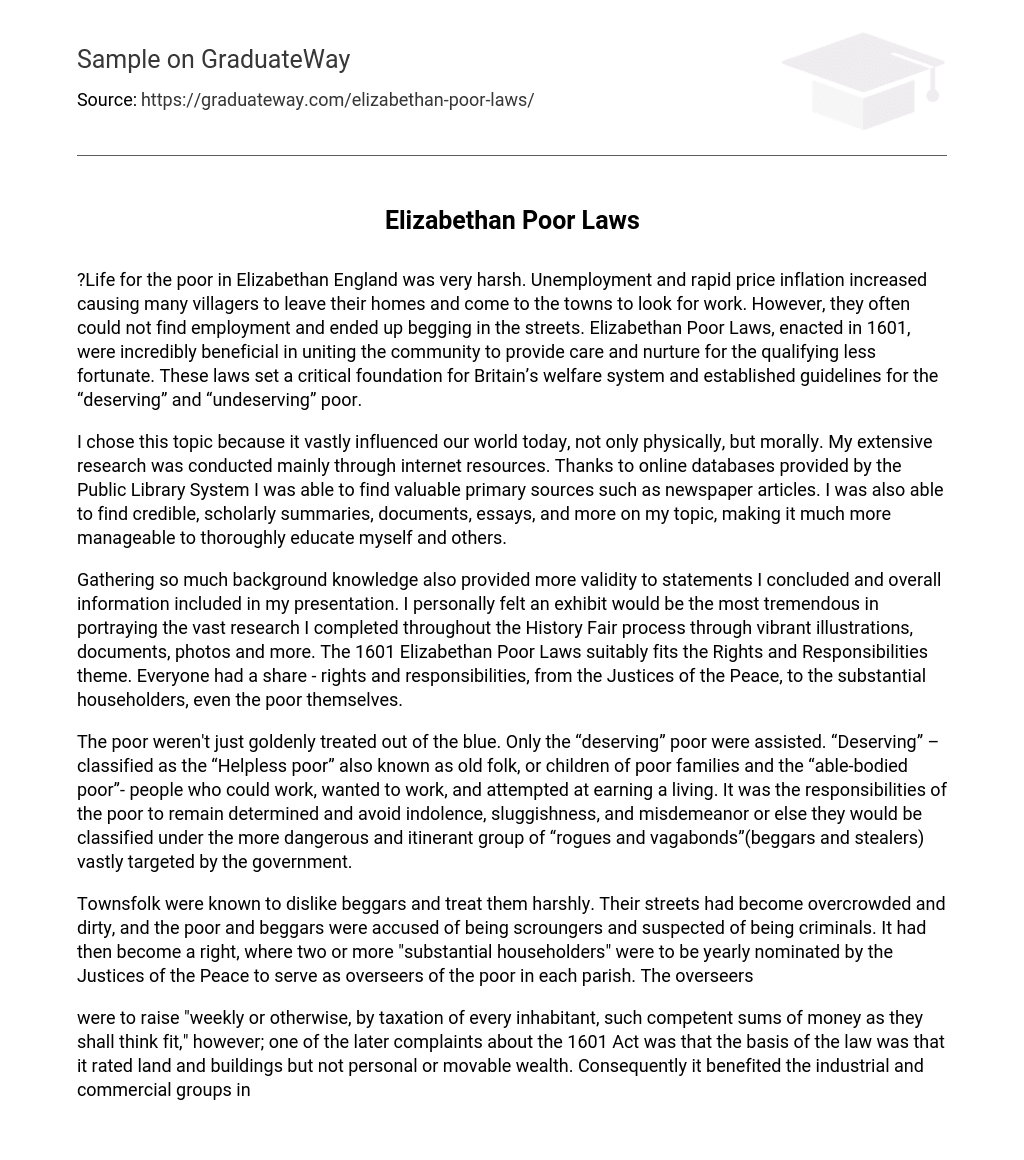In Elizabethan England, the poor faced challenges due to rising unemployment and inflation. Numerous villagers were forced to abandon their homes and move to urban areas in search of work. However, they encountered obstacles in finding employment and turned to begging on the streets.
The Elizabethan Poor Laws were implemented in 1601, which united the community in offering aid to those deemed less fortunate. These laws created Britain’s welfare system and set standards for differentiating between the “deserving” and “undeserving” poor.
The topic I chose has a significant impact on our world today, both physically and morally. I conducted extensive research online, utilizing the internet databases of the Public Library System. These databases proved invaluable in locating crucial primary sources such as newspaper articles. Moreover, I discovered trustworthy scholarly summaries, documents, essays, and other materials pertaining to my topic. The abundance of resources available made it considerably easier for me and others to acquire a comprehensive understanding of the subject.
Through accumulating significant background knowledge, I improved the trustworthiness of my statements and the overall information conveyed in my presentation. I believed that creating an exhibit would be the most efficient way to display the extensive research I conducted throughout the History Fair process. This exhibit would consist of lively illustrations, documents, photos, and additional materials. The 1601 Elizabethan Poor Laws are well-aligned with the theme of Rights and Responsibilities as they showcase how everyone, including Justices of the Peace, substantial householders, and even the poor themselves, had roles to fulfill in both rights and responsibilities.
The poor were not treated well without discrimination. Only the “deserving” poor were given assistance, which encompassed the “Helpless poor,” comprising elderly or children from impoverished families, and the “able-bodied poor,” who were capable individuals actively seeking employment and self-sufficiency. It was incumbent upon the impoverished to remain resolute, avoiding idleness, lethargy, and misconduct; otherwise, they risked being classified as part of a more hazardous and transient faction called “rogues and vagabonds” (beggars and thieves), which faced significant government scrutiny.
The townspeople held a strong dislike for beggars and treated them with cruelty. The town streets had become crowded and unsanitary, leading to the poor and beggars being viewed as lazy opportunists possibly involved in criminal activities. Consequently, the Justices of the Peace were obligated to annually select two “substantial householders” in each parish to supervise the well-being of the impoverished.
The overseers had the responsibility of collecting funds from residents through taxation, with the frequency and amount left to their discretion. However, a later concern emerged regarding the 1601 Act as it only took into account the value of land and buildings for tax purposes, disregarding personal or movable assets. Consequently, this favored the industrial and commercial sectors who were not subject to the law and therefore did not contribute to supporting those in poverty unless they possessed land as well.
The 1601 Elizabethan Poor Law, along with subsequent laws such as the 1662 Settlement Act, Gilbert’s Act (1782), and the Speenhamland system of 1795, endured until the enactment of the 1834 Poor Law Amendment Act. This act served as the foundation for poor relief in the country for over two centuries. The system operated fairly and impartially, managed by local individuals during a period when the population was small enough for everyone to be familiar with each other’s conditions and circumstances.
The 1601 Elizabethan Poor Laws emphasized the importance of caring for the poor in our current society, highlighting its divine purpose. It is incumbent upon us to heed this guidance from those less fortunate and use it as a compass for our endeavors in international development with the goal of eradicating poverty. These laws acknowledge that assistance, when applied appropriately with specific targets and effectiveness, can and should be utilized to make progress in areas such as health, education, and overall well-being for impoverished individuals. In line with Thomas Jefferson’s proclamation, a good government’s primary and exclusive objective should be the nurturing of human life and happiness rather than their destruction.





